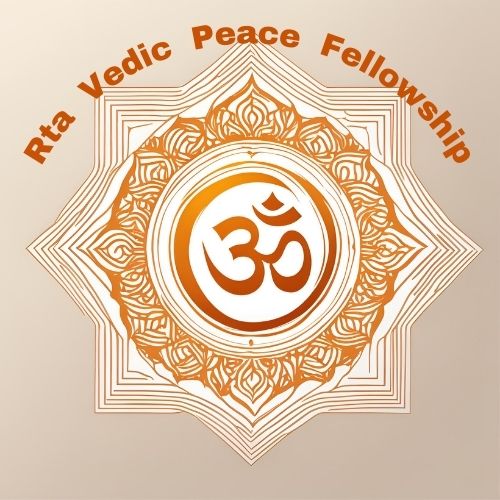About Us
VEDIC PERSPECTIVES
ON PEACE AND HARMONY
Who we are:

Rta Vedic Peace Fellowship is an association of spiritual mentors in India who came together for deepening our understanding of the Vedas and spiritual growth.
We focus on the teachings of specific Hindu scriptures or philosophical texts. We also impart guidance on personal enlightenment and self-realisation.
We take part in satsangs, chanting and meditation. We are similar to say Christian church groups or Bible-study groups who meet to study scripture and pray.
It is our religious duty to promote higher levels of harmony and peace at the individual level (life choices) as well as the collective or planetary level (interaction with nature). There is interconnectedness (Rta) between both and that is central to Hindu beliefs, practices and philosophy.
Interconnectedness of all life forms (Rta)

What is Rta?
In the Vedic tradition, Ṛta is a fundamental concept representing the principle of natural order that governs the universe. It is seen as the cosmic law that ensures the natural, moral and other orders. Over time, the concept of Rta became connected with Dharma (duty and righteousness) and Karma (the law of cause and effect) – both central to Hindu philosophy and intricately linked.
By following Dharma, individuals can generate positive Karma, creating a virtuous cycle of cause and effect. Neglecting Dharma can result in negative Karma and undesirable outcomes. Undesirable outcomes can manifest themselves at the individual and collective (planetary) levels.
The Vedas emphasize the interconnectedness of all life forms. Humans, animals, plants, and the elements are all part of a cosmic order (Rta) that needs to be respected and maintained.
What we do:

Rta Vedic Peace Fellowship is dedicated to promoting philosophical discourse on minimising planetary disharmony. We conduct and share our thought experiments on potential solutions for the existential threats facing life forms on the planet today, including:
- Environmental degradation (e.g; climate change)
- Natural-resource depletion (e.g; energy-resource rivalry)
The common denominating factor is man’s use of matter energy in radiating-motion systems.
The scientific view is that these existential threats are part of a terminal decree issued by nature, on all life forms on Earth. The decree is what is known as the thermodynamic perspective of life.
According to this perspective, life is a system in disequilibrium that keeps equilibrium at bay (ensures survival) by exchanging high-entropy outputs for low-entropy inputs.
Applied to our industrialisation, the upshot is that an organism cannot survive in a medium of its own waste products and has to compete for declining life-support resources.
In the Vedas, nature is seen as the manifestation of, or the art of, the Devine. As a religious Fellowship dedicated to the Devine, we do not accept the proposition which is explicit in science, that it is nature that has issued the terminal decree on all life forms on Earth. As defenders of nature, we conduct thought experiments, grounded in religious teachings and meditation, to explore whether science, the art of man has misrepresented nature, the art of the Devine.
Our Fellowship focuses on revealing that nature, as the art of the devine, has never placed any limitations on life forms on Earth. Rather, it has made ample provisions for human development. In other words, we focus on revealing that contrary to the scientific view, the Earth is neither energy-limited nor inherently entropic.
Our thought experiments are philosophical, based on religious teachings and deliberation through meditation. They take many years to mature. When a particular thought experiment has matured sufficiently to the point that we feel it may enlighten humanity in reducing developmental or planetary disharmonies, the Fellowship’s autonomous authors patent and publish it, ensuring it becomes prior art in law and can only be exploited commercially by the Fellowship for its benevolent purposes.
The Vedic approach to planetary peace and harmony is distinct from Western approaches. Nonetheless, global peace is essential for a self-regulating market system, which requires ever-increasing global standards of living despite ever-decreasing natural resources.



